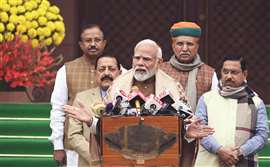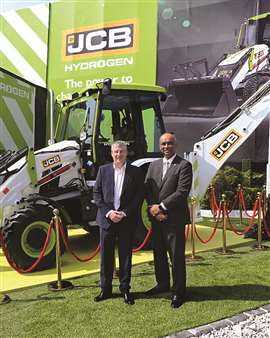India is currently investing heavily in its future, resulting in extensive development across the country’s landscape.
According to Off-Highway Research, the specialist construction equipment market researcher, the market for construction equipment in India is currently buoyant. The company estimates that demand grew 17% in 2023 over the previous year.
Dimitrov Krishnan, co-chairman of Excon 2023, one of India’s leading international construction trade shows, and managing director of Volvo Construction Equipment, India, says that India is undergoing a rapid and transformative expansion of its infrastructure, spurred by increased government investments and ambitious development initiatives.
“This transformation encompasses significant advancements in India’s transportation networks, spanning roads, railways, aviation, and waterways, all of which are poised to have a profound impact on India’s economic growth,” he comments.
“The Indian construction equipment industry made a remarkable resurgence in the fiscal year 2022-23, achieving an impressive 26% growth. This outstanding performance propelled total sales of construction equipment to surpass the one lakh milestone [100,000 units], firmly establishing India as the world’s third-largest construction equipment market.”
Shalabh Chaturvedi, managing director of India and South Asian Association for Regional Cooperation at Case Construction Equipment agrees with Mr Krishnan that India’s construction industry is going through a period of expansion.
He notes that the sector had seen significant growth over the last two fiscal years, varying from 18% to 20% across different types of equipment.
India has goals regarding investing in infrastructure until 2030.
 Shalabh Chaturvedi, Managing Director, Case Construction Equipment (Photo: Case Construction Equipment)
Shalabh Chaturvedi, Managing Director, Case Construction Equipment (Photo: Case Construction Equipment) “This ambitious initiative has instilled confidence in construction equipment firms,” says Mr Chaturvedi. He added that this had led to, “increased investments in India’s growth potential.”
He suggests that the country could become the second-largest construction equipment market by 2030.
Infrastructure projects in India
India has undertaken an array of infrastructure projects under the Gati Shakti Programme to drive significant development. This is an initiative to create a holistic and integrated infrastructure network in India.
The projects will cover 16 sectors, such as energy, logistics, and health. In addition to this, says Deepak Shetty, CEO and managing director of JCB India, it will use digital technologies and data analytics to optimise project planning and execution.
The programme hopes to boost economic growth, social development, and national security by enabling faster and smoother movement of people, goods, and services.
Mr Shetty adds that, as part of the National Infrastructure Pipeline, there are also various projects that are at different stages of completion. New expressways, highways, and rural roads are being built to ensure connectivity between cities, towns and villages.
 India has undertaken an array of infrastructure projects under the Gati Shakti Programme to drive significant development (Photo: Adobe Stock)
India has undertaken an array of infrastructure projects under the Gati Shakti Programme to drive significant development (Photo: Adobe Stock) “Additionally, projects such as Bharatmala and Sagarmala are also creating strong momentum for the construction equipment market. Bharatmala will link the country through a network of highways, expressways, economic corridors, border roads, coastal roads, and greenfield roads,” says Mr Shetty.
The Sagarmala Programme is an initiative by the Indian government to enhance the performance of the country’s logistics sector. The programme envisages unlocking the potential of waterways and the coastline to minimise infrastructural investments required to meet these targets.
Significant advancements are also underway in the railway sector, says Mr Chaturvedi, including the Bombay–Ahmedabad high-speed rail and the development of new railway lines, such as the trans-harbour rail line.
He adds, “Ongoing projects in residential and industrial sectors, like the Central Vista development in Delhi, contribute to the dynamic landscape of the construction equipment sector in India. This diverse range of projects underscores the promising growth prospects for the industry.”
For Mr Krishnan of Volvo CE, a standout project is the Himank, undertaken by the Border Roads Organization. The project aims to construct the world’s first motorable road through glaciers in Ladakh’s eastern region, situated at a height of 17,800 feet.
What’s trending in India’s construction market?
The Indian construction market is experiencing similar trends to those of the Western world, with technology and sustainability being notable focuses.
 Prime Minister Narendra Modi addresses the media on the first day of the Budget session of Parliament, Jan 31, 2024, New Delhi, India. (Photo: Sanjeev Verma/Hindustan Times/Sipa USA)
Prime Minister Narendra Modi addresses the media on the first day of the Budget session of Parliament, Jan 31, 2024, New Delhi, India. (Photo: Sanjeev Verma/Hindustan Times/Sipa USA) “There is a growing emphasis on technology integration, including the adoption of digital tools and construction management software. A significant shift toward sustainability is evident, with an increasing preference for electric construction machines to reduce environmental impact,” reveals Mr Krishnan.
“The government’s focus on infrastructure development, coupled with a rising awareness of green building practices, is shaping the industry. It’s an evolving landscape, and continuous monitoring is crucial to staying abreast of dynamic developments in technology adoption and the rise of eco-friendly construction practices.”
Agreeing that technology is a popular trend, Case’s Mr Chaturvedi sees a growing adoption of telematics aimed at enhancing machine productivity. “This technology empowers customers to remotely monitor various facets of the machine, crucially including fuel consumption, a vital consideration for Indian customers,” he says.
“Telematics enables customers to keep track of the machine’s location, and operational hours, and receive timely alerts for potential issues like increasing coolant temperature or fuel adulteration. These alerts are conveniently delivered through a mobile application, facilitating proactive maintenance and operational efficiency.”
Highlights from Excon 2023
Technology and sustainability were also key themes at construction equipment event, Excon, held in Bengaluru in December 2023. Last year’s theme was ‘Building India’s Tomorrow: Technology, Globalization, Sustainability, Inclusiveness’.
In his role as co-chairman of Excon 2023 as well as his role for Volvo CE, Mr Krishnan, says that the theme of the show highlighted the critical role of technology in shaping India’s future, emphasising the need for innovation and the adoption of cutting-edge technologies to enhance efficiency and quality.
Excon 2023 reported the participation of over 1,100 exhibitors from India and overseas, providing a comprehensive display of machinery and construction technologies across a vast exhibition area.
 JCB showed its hydrogen combustion technology at Excon (Photo: JCB)
JCB showed its hydrogen combustion technology at Excon (Photo: JCB) At the show, JCB unveiled its hydrogen combustion technology. The company says that this was its first-ever trade show appearance for JCB’s hydrogen-powered backhoe loader prototype, part of a £100 million (US$126 million) investment, which was unveiled alongside JCB’s hydrogen combustion engine.
JCB’s Mr Shetty says that they are seeing a concerted effort from the government towards the integration of alternate fuels for the construction equipment industry. He adds that the National Hydrogen Mission is creating an ecosystem for Hydrogen in India.
In 2023, the Indian Union cabinet approved the National Green Hydrogen Mission to develop green hydrogen production capacity along with renewable energy capacity to reduce greenhouse gas emissions by 2030.
Like JCB, Case is working to stay ahead of the curve. The sector is undergoing a gradual shift towards the new and environmentally friendly emission standards (BS V CEV/TREM).
Mr Chaturvedi says that Case is fully prepared with upgraded equipment for the imminent implementation of the new emission standard. He added that this not only expands their sustainable portfolio but also opens up global markets in the US and Europe for the company’s Made-in-India products.
A bright future for construction
The future for India’s construction industry appears to be going from strength to strength.
With substantial investments and positive industry trends, the outlook for construction equipment sales in 2024 and beyond is optimistic. However, it is worth noting that between April and May 2024, a general election is scheduled to be held – this typically negatively impacts growth for the construction sector.
Mr Chaturvedi believes that the industry’s commitment to growth is evident through strategic investments made over the past decade and a planned outlay for the next one and a half years. He says, “As part of the Governing Council of the Indian Construction Equipment Manufacturers Association, there’s a collective vision for transformative growth, reflecting confidence in the industry’s potential. The stage is set for sustained growth in equipment sales.”
JCB’s Mr Shetty is also optimistic as we settle into 2024. He says that construction equipment sales in India should remain strong, despite the disruption of the national elections.
In addition, infrastructure development is predicted to receive further strong investment in the upcoming union budget so the outlook for construction equipment remains robust.
“With global best practices being introduced at work sites in India, we are seeing a significant focus on safety, efficiency and environmental protection,” says Mr Shetty. “This will inevitably contribute to the demand for new construction equipment.”
Form placeholder






















